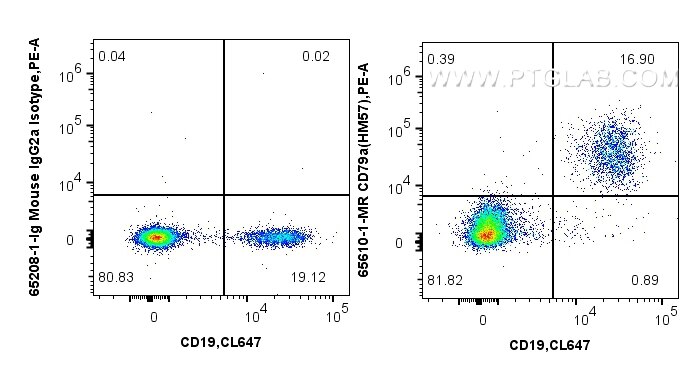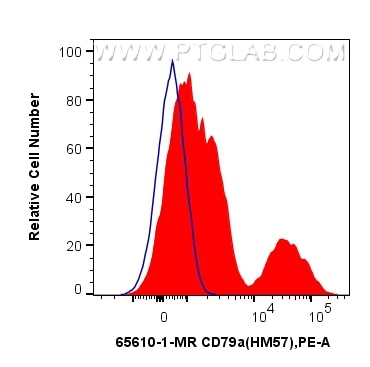Tested Applications
| Positive FC (Intra) detected in | human PBMCs |
Recommended dilution
| Application | Dilution |
|---|---|
| Flow Cytometry (FC) (INTRA) | FC (INTRA) : 0.25 ug per 10^6 cells in 100 μl suspension |
| This reagent has been tested for flow cytometric analysis. It is recommended that this reagent should be titrated in each testing system to obtain optimal results. | |
| Sample-dependent, Check data in validation data gallery. | |
Product Information
65610-1-MR targets CD79a in FC (Intra) applications and shows reactivity with human samples.
| Tested Reactivity | human |
| Host / Isotype | Mouse / IgG2a |
| Class | Recombinant |
| Type | Antibody |
| Immunogen |
Synthetic peptide corresponding to 202-216 amino acid sequence of human CD79a Predict reactive species |
| Full Name | CD79a molecule, immunoglobulin-associated alpha |
| GenBank Accession Number | BC113731 |
| Gene Symbol | CD79A |
| Gene ID (NCBI) | 973 |
| RRID | AB_3670357 |
| Conjugate | Unconjugated |
| Form | Liquid |
| Purification Method | Protein A purification |
| UNIPROT ID | P11912 |
| Storage Buffer | PBS with 0.09% sodium azide, pH 7.3. |
| Storage Conditions | Store at 2-8°C. Stable for one year after shipment. |
Background Information
CD79a, also named as B-cell antigen receptor complex-associated protein alpha chain or MB-1 membrane glycoprotein, is a 226 amino acid protein, which contains one ITAM domain and one Ig-like C2-type (immunoglobulin-like) domain. CD79a is expressed in B cell and localizes in the cell membrane. CD79a is required in cooperation with CD79b for initiation of the signal transduction cascade activated by binding of antigen to the B-cell antigen receptor complex (BCR) which leads to internalization of the complex, trafficking to late endosomes and antigen presentation. CD79a is also required for BCR surface expression and for efficient differentiation of pro- and pre-B-cells.
Protocols
| Product Specific Protocols | |
|---|---|
| FC protocol for CD79a antibody 65610-1-MR | Download protocol |
| Standard Protocols | |
|---|---|
| Click here to view our Standard Protocols |






